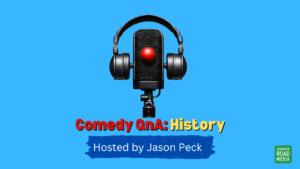After my last post on joke stories, here comes the fun part. You’re gonna edit your street joke down. Don’t feel that you’re not qualified. You are don’t worry. As long as you can speak and paraphrase you’re gonna be fine at editing a street joke, or joke story if you prefer.
A word of warning though: this blog won’t make you Dane Cook or Eddie Izzard or Mel Miller, just so you know. Becoming a comedian like that is a whole other ball game.
Make sure you’re on your own. Like… sitting in front of your computer. Yeah, that’s a good idea. Okay say take your joke and say it out loud:
“One day the teacher asked her students to use the word “contagious” in a phrase. Sarah lifts up her hand and says, “Teacher, teacher I got one!! A cold is contagious!”
The teacher is very happy. Tom lifts up his hand and says, “Teacher… yawning is contagious” “pretty good Tom!!”
Finally, little Johnny lifts up his hand and says, ” Oh…Oh…I got one…The other day, as my mother was mowing the lawn, my father looked out the window and said it will take that contagious to finish!!”
It won’t feel comfortable somehow. Most jokes that appear in joke books like Thats Comedy or get forwarded to you are written to be read and NOT spoken.
What? I’ll say it again, most joke stories that you receive from a book or via the web are written to be read and NOT spoken.
The two are completely different.
When you write something to be read it has to make sense with its sentence structure. Most jokes have a small story element to them and so that’s what’s included. For example:
“One day…”
or
“…and says”
Those are structures that we are used to and help us when we are reading the joke story.
But they are not at all helpful when you have to deliver that joke.
So read the joke out loud a few times to familiarise yourself with it. Then put it to one side and repeat it a few more times. Just give yourself a bit of “rehearsal” with it.
What will begin to happen slowly is that you’ll forget bits of the joke and, as a result, paraphrase the joke story into your own words.
You’ll naturally make shortcuts. Believe me, this is not a bad thing. This is exactly what you want to happen.
As you do this try to cut out the storytelling elements. so for instance, with my joke I’d start it straight away with:
“A teacher asks…”
I also think it’s better to keep the joke in the present tense. even if it’s happened in the past. You’ll say something like “last year…” then the tense will immediately change as if it’s happening right now.
That street joke has got to unfold in front of your audience like it happening in the here and now. it makes it more immediate and, here comes the wanky bit, puts you right in the middle of the emotion.
I know, I know. that’s the old actor in me. (well, there’s not an old actor in me right now… but I have trod some boards in the past and performed Shakespeare. But I got some help, I worked through it and I’m over it now).
Okay, just know that keeping a joke story in the present tense keeps it more alive. So: “I’m walking” or “I walk” is better than “I walked”. (I know “I’m walking” is not strictly in the present tense, but it’s slightly better than the past tense).
Pair it right the way down so you are left with enough key elements to make the joke work. How do you know what will make the joke story work? Well, for starters the punchline is pretty damned important.
The set-up is important as well, but that can usually do with a bit of trimming. The punchline’s the bit at the end that gets the laugh. Sorry if I’m stating the obvious for some of you, I just wanna make sure we’re all on the same page.
In the case of my joke, the punchline is:
“my father looked out the window and said it will take that contagious to finish!!” The other kids names aren’t necessary to my joke either. They’re superfluous. Their parents might not think they’re superfluous, but they are in my joke story and that’s what matters.
The important kid is the one who gives us the punchline. Naming the other kid’s just provides extraneous information that just distracts from the story.
That’s when you start getting into that dangerous territory, like when someone tells a joke and they start filling in irrelevant details:
“One day the teacher, Mrs. Slackjaw… at least I think that was her name. Maybe that name just sounds too jokey… um… Mrs. Robinson… Ah, see, now you’re thinking of The Graduate. I did like that movie. Anyway, okay, not Mrs. Robinson. Mrs… um…”
Whoa, hold on there. too much information. I’ve just walked out the room and thrown myself under a bus ‘cos you were taking so long.
so when you’re saying the joke out loud, make sure that you try to use your everyday colloquialisms. so maybe you take the line:
“Sarah lifts up her hand and says”
and edit it like this:
“another kid puts her hand and says”
or even:
“another kid’s like (then you put your hand in the air pretending to be the kid)”.
With that last line we’re beginning to borderline with delivering the joke. That’s not a bad thing because the editing and delivering the joke are fused together at the hip.
What do you think you’ve been doing when you were saying the joke out loud to yourself? You were delivering it.
Okay, so you had no audience but you were delivering it all the same. Check out this joke story resource here: That’s Comedy
Note: There are affiliate links on this page. That means that if you make a purchase via my link I get paid a commission. It’s how I can help pay the bills.



